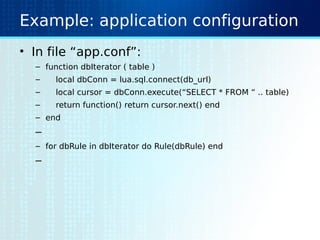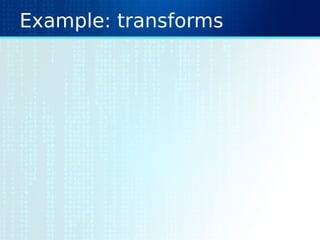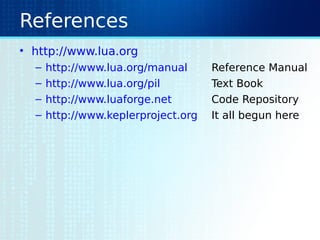Lua is a lightweight scripting language that is easily embeddable. It incorporates many innovations from other languages like Python and Ruby. The document discusses Lua's core concepts including data types, tables, functions, environments, object orientation, and the C API. It provides code examples to demonstrate Lua's features like iterators, coroutines, metatables, and using Lua to configure applications by loading rules from a file.

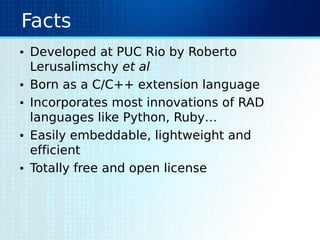
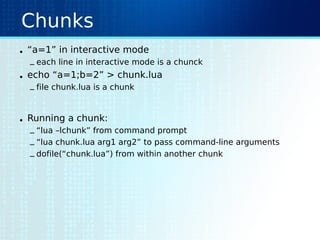
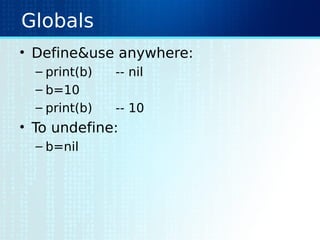
![The interpreter
• Passing chunks:
– lua –lchunk –e “a=math.sqrt(b)”
chunk.lua
• Passing command-line arguments:
– lua –i –e “c=‘Hi !’” chunk.lua 1 2 3
– print(arg[1])
– print(arg[2])
– print(arg[3])
– print(arg[-1]) --???!!!](https://image.slidesharecdn.com/hands-onlua-140527083112-phpapp02/85/Hands-on-lua-5-320.jpg)
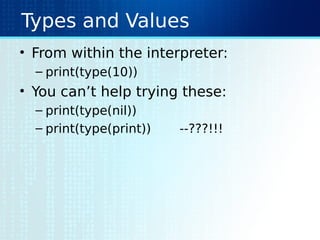
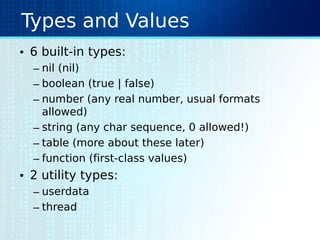
![Tables
• From within the interpreter:
– t = {}
– t[“key”] = “value”; print(t[“key”])
– print(t[“otherkey”])
– t[1] = “first”; print(t[1]); print(t[“key”])
– print(t.key) --???!!!
– t = { key=“value”, otherkey=“first” }
– t = { key=“value”, 1=“first” } --???!!!
– t = { key=“value”, [1]=“first” }
– print(t.1) --???!!!](https://image.slidesharecdn.com/hands-onlua-140527083112-phpapp02/85/Hands-on-lua-8-320.jpg)
![Arrays
• From within the interpreter:
– t[1] = ‘a’; t[2] = ‘b’; t[3] = ‘c’
– print(t[1] .. t[2] .. t[3])
– print(t[-1]) (got what you expected?)
– t[-1] = ‘z’
– print(t[-1])
– print(t) --???!!!
– print(unpack(t))](https://image.slidesharecdn.com/hands-onlua-140527083112-phpapp02/85/Hands-on-lua-9-320.jpg)
![Functions
• From within the interpreter:
– function f ( a ) return a^2 end
– print(f(2))
• Functions are first-class values:
– t = {}
– t[“square”] = f
– print(t.square(2))](https://image.slidesharecdn.com/hands-onlua-140527083112-phpapp02/85/Hands-on-lua-10-320.jpg)
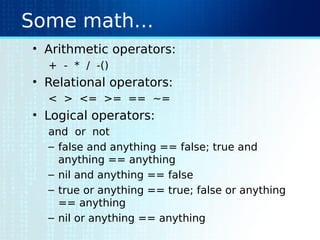
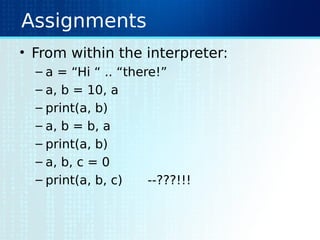
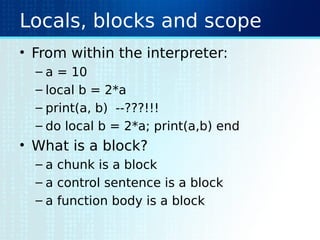
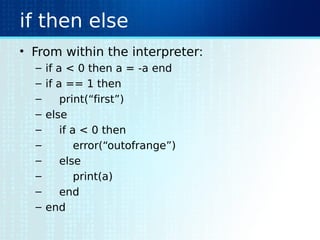
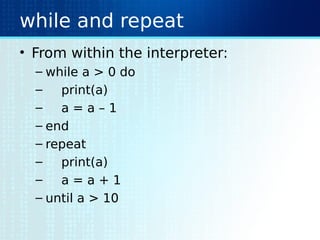
![for
• From within the interpreter:
– for i=1,10,2 do print(i) end
– pets = { “cat”, “dog”, “bunny” }
– for i,pet in pairs(pets) do print(i, pet) end
– for i,pet in ipairs(pets) do print(i, pet) end
– pets[“ops”] = “lion”
– for i,pet in pairs(pets) do print(i, pet) end
– for i,pet in ipairs(pets) do print(i, pet) end](https://image.slidesharecdn.com/hands-onlua-140527083112-phpapp02/85/Hands-on-lua-16-320.jpg)
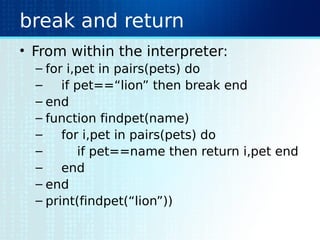
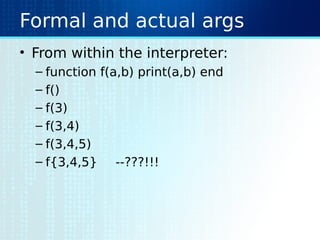
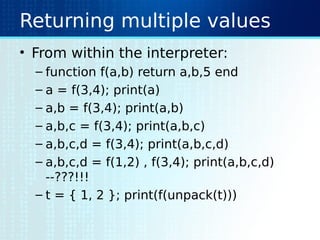
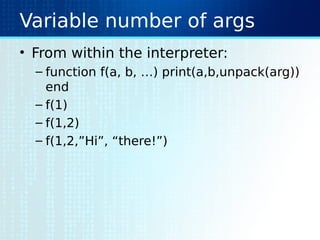
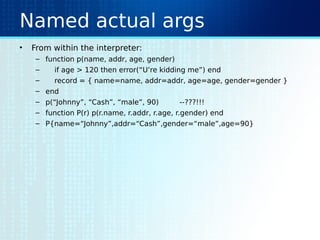
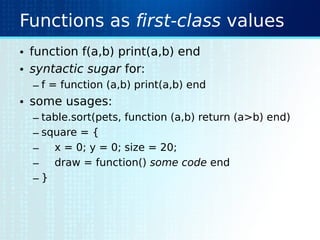
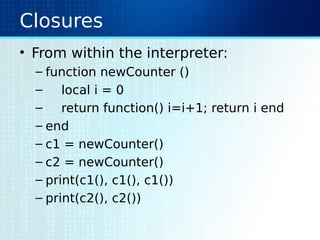
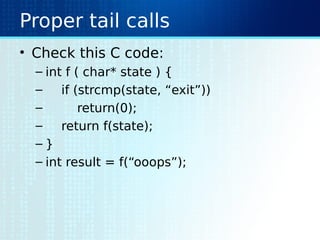
![Iterators
• From within the interpreter:
– function words ( filename )
– local file = io.open(filename)
– local line = file:read()
– local i = nil
– return function ()
– local b, e
– while not b do
– if not line then return nil end
– b,e = string.find(line, "[%w_]+", i)
– if b then
– i = e + 1; return string.sub(line, b, e)
– else
– i = nil; line = file:read()
– end
– end
– end
– end
–
– for word in words("chunk.lua") do print(word) end](https://image.slidesharecdn.com/hands-onlua-140527083112-phpapp02/85/Hands-on-lua-25-320.jpg)
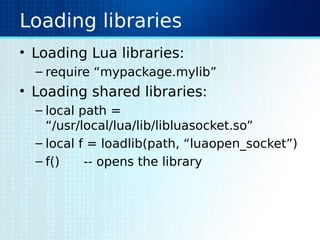
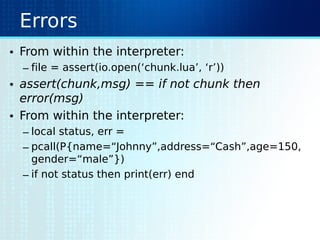
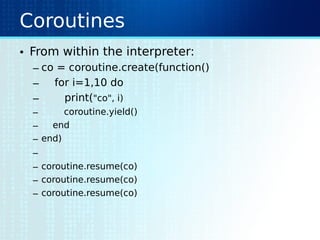
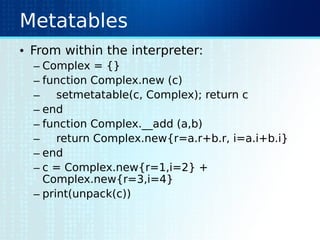
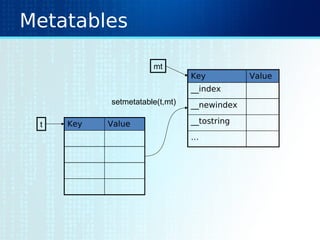
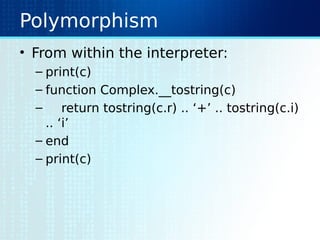
![Inheritance
• From within the interpreter:
– Phone = {}
– Phone.keypad = {[1]=“1”, [2]=“2”}
– function Phone.dial ( keys ) print(keys) end
– CarPhone = {}
– CarPhone.mike = io
– CarPhone.dir = { Johnny = “112”, Cash = “211” }
– function CarPhone.voice_dial ()
– CarPhone.dial(CarPhone.dir[CarPhone.mike.read()])
– end](https://image.slidesharecdn.com/hands-onlua-140527083112-phpapp02/85/Hands-on-lua-32-320.jpg)
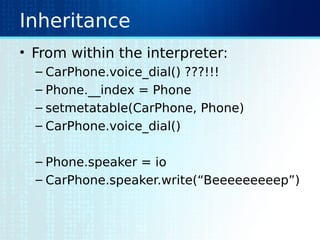
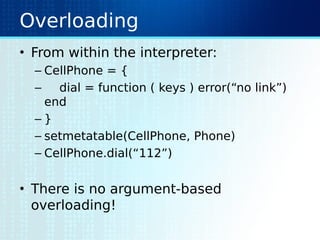
![Metamethods
• List of metamethods:
– add (+)
– sub (-)
– mul (*)
– div (/)
– mod (%)
– pow (^)
– unm (-)
– concat (..)
– len (#)
– eq (=)
– lt (<)
– le (<=)
– index ([])
– newindex
– call (())](https://image.slidesharecdn.com/hands-onlua-140527083112-phpapp02/85/Hands-on-lua-35-320.jpg)
![The environment
• From within the interpreter:
– print(_G._G == _G) ???!!!
– for gv in pairs(_G) do print(gv) end
– for obj in pairs(_G) do
– if string.find(obj, “Phone$”) then
– _G[obj].dial(“112”)
– end
– end
– setmetatable(_G, {
– __newindex = function(_,gv) error(“read only!”) end,
– })
– newglobal = “oopss”](https://image.slidesharecdn.com/hands-onlua-140527083112-phpapp02/85/Hands-on-lua-36-320.jpg)
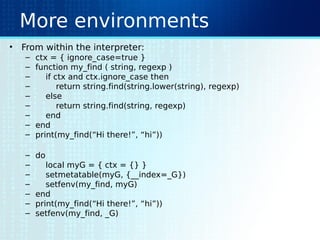
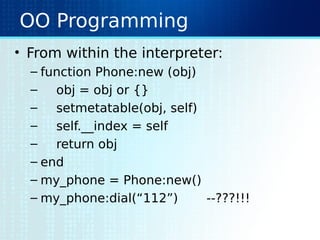
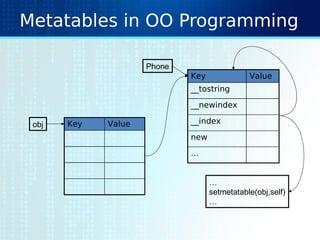
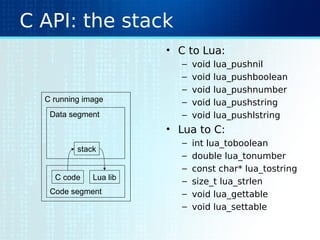
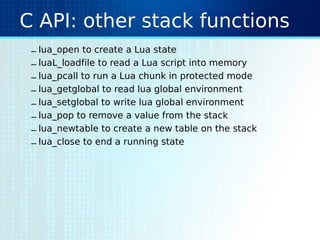
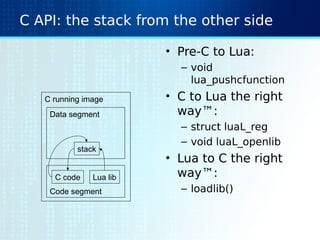
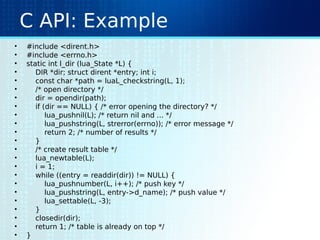
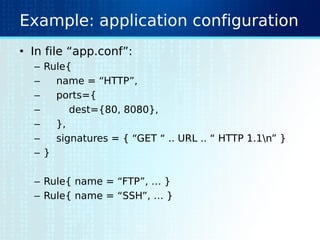
![Example: application configuration
• In file “main.c”:
– typedef struct { char*name, int* ports, char** signatures } Rule;
– static Rule rules[256];
– static int numRules = 0;
– static int readRule ( lua_State* L ) {
– if (numRules == sizeof(rules)) return 0;
– Rule rule;
– rule.name = lua_tostring(L, 1);
– rule.ports = …
– rule.signatures = …
– rules[numRules++] = rule;
– return 0;
– }
– …
– int main ( int argc, char** argv ) {
– lua_State* L = lua_open();
– luaL_loadfile(L, “app.conf”);
– lua_pushcfunction(L, readRule);
– lua_setglobal(L, “Rule”);
– lua_pcall(L, 0, 0, 0);
– }](https://image.slidesharecdn.com/hands-onlua-140527083112-phpapp02/85/Hands-on-lua-45-320.jpg)
